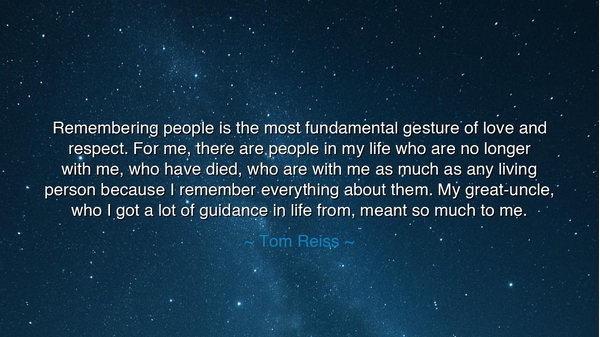
Remembering people is the most fundamental gesture of love and
Remembering people is the most fundamental gesture of love and respect. For me, there are people in my life who are no longer with me, who have died, who are with me as much as any living person because I remember everything about them. My great-uncle, who I got a lot of guidance in life from, meant so much to me.






Hear, O children of memory, the words of Tom Reiss, who spoke with reverence of the unseen bond: “Remembering people is the most fundamental gesture of love and respect. For me, there are people in my life who are no longer with me, who have died, who are with me as much as any living person because I remember everything about them. My great-uncle, who I got a lot of guidance in life from, meant so much to me.” In these words lies a truth more enduring than stone: that those who are remembered do not vanish, and that memory itself is an act of love that binds the living and the dead together in eternal fellowship.
The meaning of these words is both tender and profound. To remember is not simply to recall the facts of a life, but to keep alive the spirit, the guidance, the laughter, the wisdom of those who have gone. Forgetfulness is a second death; remembrance is immortality of the heart. In Reiss’s testimony, his great-uncle, though dead, still walks beside him because his teachings and presence live on in memory. Thus we see that love and respect are not ended by death—they are carried forward when we refuse to let the lives of others fade from the tapestry of our souls.
Consider, O hearers, the tale of the ancient Greeks and their heroes. For them, immortality was not granted by gods alone, but by song and story. Achilles, Hector, Odysseus—all would have been lost to the dust of ages had not poets sung their names. To remember them was to honor them, and to honor them was to keep them alive for generations yet unborn. Likewise, in every culture, memorials are raised, songs are sung, and stories told—not merely to record history, but to perform the deepest gesture of love: to ensure the departed still dwell among us.
The origin of Reiss’s words lies in personal experience, drawn from the love of a great-uncle whose counsel shaped his life. Yet his words extend beyond the personal, echoing the universal truth: that every person carries within them the living presence of those they have lost, so long as memory endures. This truth has been whispered across ages, whether in the candles lit on holy days, the names carved upon stone, or the tales told at family gatherings. In each case, memory is not passive—it is active, deliberate, sacred.
Let us not mistake his statement for mere sentimentality. To remember everything about them is not simply nostalgia—it is to embody the lessons they taught, to carry forward their guidance as a torch in the darkness. In this way, remembrance is not only a gift to the departed, but a source of strength for the living. By keeping the dead alive in memory, we draw upon their courage, their wisdom, their love, and allow it to shape our actions in the present. Thus remembrance becomes a bridge across time, uniting the past with the future.
The lesson is clear: to forget is to lose, but to remember is to love. When we honor the memory of those who guided us, we not only keep them close, but we also cultivate gratitude and humility within ourselves. For no life is lived alone—each of us walks upon paths laid down by those who came before. To remember them is to acknowledge the gift of their labor, their sacrifice, their care.
Practical actions lie before you: speak often the names of those you have lost. Tell their stories to your children, so that their light does not fade. Visit the places where they once walked, and let your heart be stirred by their presence. Write down their lessons, carry forward their virtues, and live in such a way that your life becomes a continuation of theirs. In doing so, you both honor them and strengthen yourself.
Thus, O heirs of tomorrow, let Reiss’s words resound in your soul: remembering people is the most fundamental gesture of love and respect. For memory is the lamp that banishes the darkness of forgetting. Hold close those who have passed, for they are with you still, as surely as breath and heartbeat. And when your own time comes, may you also be remembered with love, so that your spirit, too, will walk beside those who follow. To remember is to love; to love is to make eternal.






AAdministratorAdministrator
Welcome, honored guests. Please leave a comment, we will respond soon